When Search Engines were created, an entirely new era began:
an era of Search Engine Optimization – SEO.
SEO is all about improving your website’s visibility on various search engines. Now, SEO is divided into two main parts: On-page and Off-page.
In this post, i’ll expose you to a simple guide to understanding and improving your on-page SEO (Off-page SEO will be fully discussed in the next post).
I suggest you take just a little time to edit titles and descriptions on your website, this will help you improve your SEO by leaps and bounds.
Truth is, of the five main factors that alters on-page SEO, four of them can be dealt with in just a few minutes.
So, let’s start with an introduction to what SEO is all about.
Table of Contents
ON-PAGE SEO
“On-page” SEO has to do with those parts of your webpage that affect how search engines see you. These features include: title tags, meta descriptions, headings, alt tags, and the actual content of your pages
OFF-PAGE SEO
“Off-page” SEO on the other hand, talks about features that are initiated outside of your website that influence your search ranking, like inbound link building and social media sharing.
On-page SEO is very important as it helps influence how search engines see your website and how new website visitors can find you.
Keyword Optimization
If the mention of keywords makes your tummy rumble, you need not worry. Keywords started as the preferred tool of “old-school” SEO. You would need to research various blends of words and phrases and try to input them into your website in lots of places: “website design agency”, “website design Abuja”, “creative website design team”, etc.
In recent practices, keywords still play a very important role in SEO.
Search Engines like Google has greatly improved at identifying what a website is about without relying on keywords alone they can now understand websites based on wider topics and concepts. This gives them a more “human viewpoint,” which is an awesome news for us humans. This is a great relief from keyword tension and chills, which means that you can now do SEO by thinking and writing like a human being (how suitable!) instead of trying to reason like a machine.
Is Eze ACTUALLY sayING that keywords are no longer important?
Not entirely. I’ld recommend a kind’a hybrid approach: combine all your keywords with supplementary topical, conversational, and human texts as well. Make sure your sentences are engaging and give insight.
On-page SEO fully describes what the page is about
Before your on-page SEO can be improved, you need to fully understand what each page is about and what keywords adequately describe it.
When you’ve made a comprehensive list of your main search terms, the next is to optimize your various web pages. The homepage should be the first page to be optimized. The related keyword for your homepage should be the most related for your business or brand. After the homepage, you can go ahead and optimize other pages on your website.
Note: I strongly suggest you do not “overdo” your on-page optimization. Avoid stuffing up with keywords (this makes it look spammy). To know more about keyword stuffing and what to avoid, stay tuned for my next post where I will be talking about tips and tricks on Black and White Hat SEO.
The following are five (5) main elements I suggest you concentrate on for each web page that you build:
#1. Meta Title
A “meta title” signifies the actual title of a web page in your source code. It’s clearly visible as the clickable blue headline in search results.
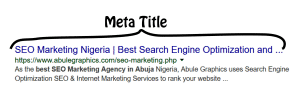
#2. Meta description
A meta description offers even more clarification of a particular web page. In your SEO settings, you’ll see this as the Description field.
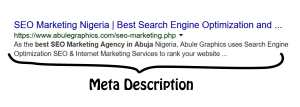
Most Digital Marketers would think of Meta Description as a web page’s Call-To-Action (CTA). This gives people looking at search engine results a more detailed description of your web page and can help them easily decide whether they should click on it to visit the webpage or not. I’ld suggest you update the meta description yourself, so that search engines will not just pull some other text from the page, which might not essentially be the best to describe the page.
The recommended character limit for every page description is between 155 to 160 characters. I would also suggest you include a page’s main terms and keywords in the description. Google will most of the time, display them in bold in the search results and as a result, this can be a big boost to click through rates.
#3. Header tags (H1, H2, and H3)
Header tags distinguish the various sections of a web page, and they help search crawlers easily figure out what your page is about. The “H1” or “H2” is not seen written anywhere if you are reading a webpage, but these tags actually appear in your source code for search engine crawlers.
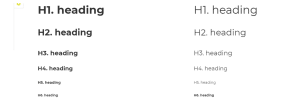
A very important on-page SEO practice is to include a page’s most related search terms in the H1 tag. The H1 heading should always be at the top of each page of your website.
If conceivable, include your page’s targeted keywords in the H2 and/or H3 tags as well.
The H2 and H3 are very helpful for structuring your page and they make your text easier to read.
Though these tags are not as important as the H1 tag to your SEO, you should never completely disregard them.
#4. Alt tags
Alt tags (or alternative tags) are descriptions written for images on your webpage. They give search engines a straightforward idea of what each image is about.
To improve ranking, i suggest you save the actual raw file of your images with a targeted keyword. For example, if your photo is of a lady’s dress in black, you should save that file as something like “lady-dress-black.jpg” rather than the default “image_0739.jpg”. Most importantly, remember to add the relevant keywords to the alt text of the images on your website. Using this same example, you would add “lady’s dress in black” as the alternative text for the image. This will go a long way in improving your website ranking.
#5. Actual Page Content
Unlike the previous ones, the actual page content is not Five-Minute-Fix but is the most important on-page SEO feature. Implementing the other four factors highlighted above without adding actual content to your web page will never get the webpage ranked in search engines. I suggest you find the time to think, research, and implement the right content for each web page to enable you attract consistent traffic from search engines.
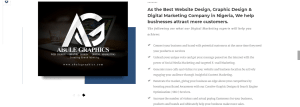
I also suggest you focus on writing content for human beings, rather than just search engines. If the content you write is engaging enough and you build pages with useful information that accurately describes your topic, you will definitely attract new visitors and lure other websites to link to your content. This will as a result, make Google and other search engines take notice and you’ll to see a boost in your website’s rankings.
Talking from experience…
At times, search engines may be likened to black boxes with mysterious and hidden spells.
Still, it’s not so difficult to learn and implement strategies that have worked for so many websites till today. I suggest you carefully examine your website and follow the above listed on-page SEO tips. This will take you many steps closer to boosting your visibility on search engines and as a result, attract impressive traffic to your website.
If you have questions and addition on on-page SEO or perhaps, you just want to say HELLO, please let me know in the comments section below.
…and remember to share.
Cheers!


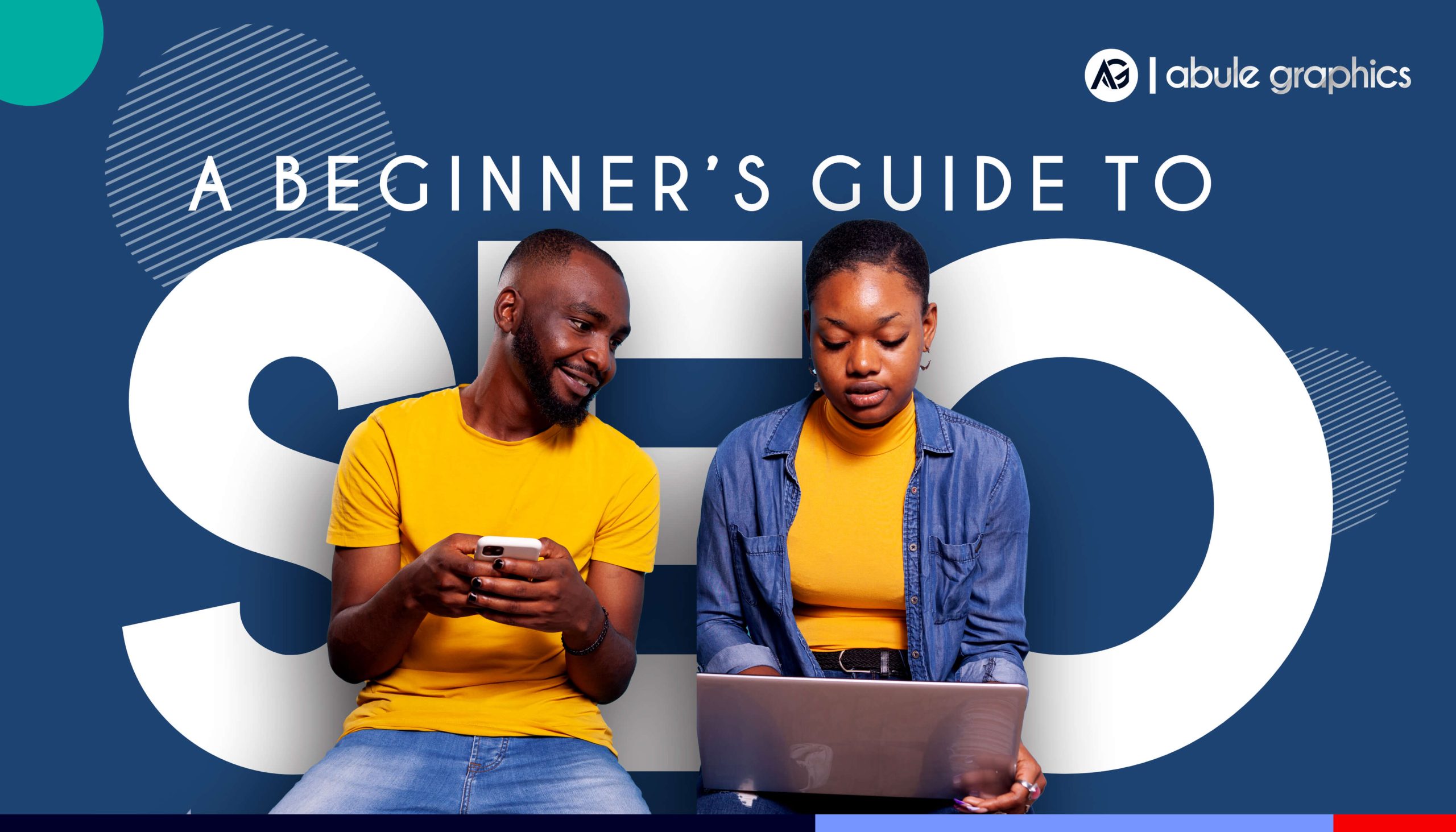

This website is… how do I say it? Relevant!! Finally
I have found something that helped me. Kudos!
Hi ZQ,
I’m glad you find it helpful.
Thanks for the feedback.
Remember to share
Hmm it looks like your blog ate my first comment (it was super long) so I guess
I’ll just sum it up what I wrote and say, I’m thoroughly enjoying your blog.
I too am an aspiring blog blogger but I’m still new to
everything. Do you have any helpful hints for inexperienced
blog writers? I’d certainly appreciate it.
Hi,
Feel free to mail me specific questions. i will be glad to answer them all.
Cheers!
I do not even know the way I ended up here, however I believed
this put up used to be good. I do not realize who you are however
definitely you are going to a well-known blogger if you happen to are not already.
Cheers!
Thanks. Please remember to share